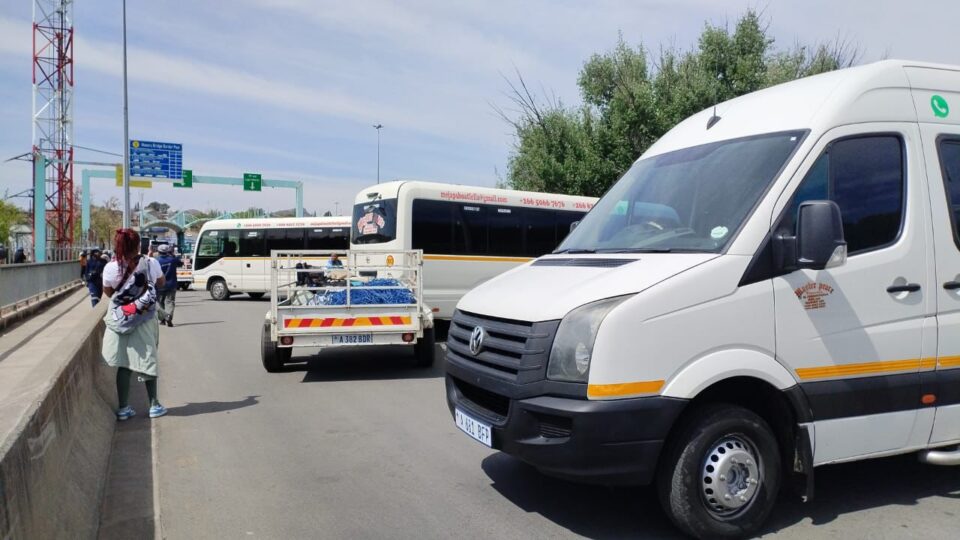…as local and Manyatseng transport operators scuffle over hawkers
…Moteane says the blockade by SA operators is illegal
Rethabile Pitso/Leemisa Thuseho
LESOTHO and South African transport operators are expected to meet today following nasty clashes between local operators and their counterparts from Manyatseng, in Ladybrand, South Africa.
The dispute erupted after Manyatseng operators barred Lesotho buses and minibuses from ferrying hawkers to Durban, where they usually buy stock.
The move angered Lesotho’s Minister of Public Works and Transport, Matjato Moteane.
At midnight on Sunday, hawkers and other cross-border passengers from Lesotho had their trips abruptly cut short and were forced to spend the night at the Maseru border post.
This followed the Manyatseng Taxi Association’s directive prohibiting Lesotho vehicles from transporting commuters, especially hawkers, into South Africa.
In retaliation, Lesotho buses and sprinters abandoned their planned trips and parked their vehicles on the bridge in protest on Monday morning, blocking vehicle movement across the border.
However, the Lesotho Mounted Police Service (LMPS) swiftly impounded the vehicles, sparking anger among Basotho who accused South Africans of undermining them while their own government failed to act decisively.
Speaking to the Lesotho Times at the scene on Monday, Manyatseng Taxi Association members argued that Lesotho operators were monopolising the transport of hawkers to South Africa, particularly Durban, and insisted that the business must be shared.
Association chairperson, Seabata Nkatane, said there had been a long-standing agreement for cooperation, but accused Lesotho operators of disregarding it.
“Since most border users are Basotho, the agreement was that Lesotho operators would bring passengers to the border and share some with South African counterparts. The same arrangement would apply on return trips,” Mr Nkatane said.
“We raised our concerns several times, but our counterparts ignored them. So, we resolved that Lesotho operators must drop passengers at the border, and we transport them to Durban. The Lesotho vehicles can then return empty and later fetch them back.
“But they still refused, so we forced them to drop all passengers at the border. Also, Lesotho operators undermine us by arranging pick-ups with passengers via phone outside ranks, which destroys our business.”
Lesotho operators, however, refuted the accusations.
One Lesotho operator, Tumane Kopanye, said Lesotho only ferries hawkers on Sundays while the rest of the week is left to South Africans, yet they remain dissatisfied.
“It is not true that we are uncooperative. We always share passengers. What frustrates us is that they change working arrangements without consulting us,” Mr Kopanye said.
“It does not make sense for them to attack Basotho while their livelihood depends on us. We call on our government to intervene.”
Another local operator, Ntomane Ntomane, said the South Africans’ new arrangement would cripple their businesses.
“A business vehicle cannot travel from the border to Durban without passengers. Fuel alone costs about M6000 per trip, excluding tollgate fees. South Africans have been exploiting us for too long, and this must stop,” Mr Ntomane said.
He also said the transport industry was already struggling due to oversaturation and low passenger demand.
“Business is bad. There are too many vehicles chasing too few passengers.”
Hawkers echoed similar frustrations, accusing South African operators of refusing to carry passengers with stock.
“We go to South Africa to buy goods for resale, but the drivers there always give us trouble. They prefer passengers without stock or luggage, which is why we work with Lesotho operators,” one hawker said.
Meanwhile, Minister Moteane condemned South Africans for barring Lesotho transport operators.
“The fact that our operators were ambushed by their counterparts despite being in possession of the required F-permits is unfortunate.
“The act undertaken by South African operators to block our operators was against the law. I do not understand how South African authorities allowed such an incidence to take place. This is something we will have to discuss with them.
“We always emphasize that it is unlawful for people who are not police officers to block the road or prevent travellers from accessing the road. It is unlawful to do that, regardless of whether it was done by a South African or a Mosotho”, Mr Moteane said.
He called for a speedy resolution, stressing the importance of finalising a Cross-border Transport Agreement with South Africa.
“The local and South African operators are meeting on Thursday and I hope they will resolve this impasse. I am unhappy when Basotho are illtreated.”
Mr Moteane attributed the chaos to the absence of a formal framework guiding cross-border transport.
“Lesotho and South Africa are about to sign a Cross-border Agreement that will clearly outline how the two sides should cooperate. I am in talks with my South African counterpart, Minister Barbara Creecy, and we expect to sign it within two to three weeks.
“By this agreement, Lesotho will join countries like Zimbabwe and Zambia, which already have similar arrangements with South Africa. The delay in our case was due to Lesotho’s unique position as a landlocked country, which requires special consideration.”
He explained that the deal would ensure fairness by specifying the number of vehicles permitted on routes like Durban for both Lesotho and South Africa.
However, he cautioned that agreements alone would not resolve disputes unless parties committed to dialogue.
“The agreement will not help if operators continue to fight over passengers. They must sit down and resolve their differences. I commend our local operators for previously showing restraint, but their current frustration is understandable since they have been asking me to fast-track the signing of this agreement for a long time.”
Mr Moteane also confirmed that vehicles blocking the bridge were temporarily impounded to clear traffic and safeguard travellers.
“I have urged police to ensure the safety of those vehicles and the valuable goods inside, which must be returned to their rightful owners.”

